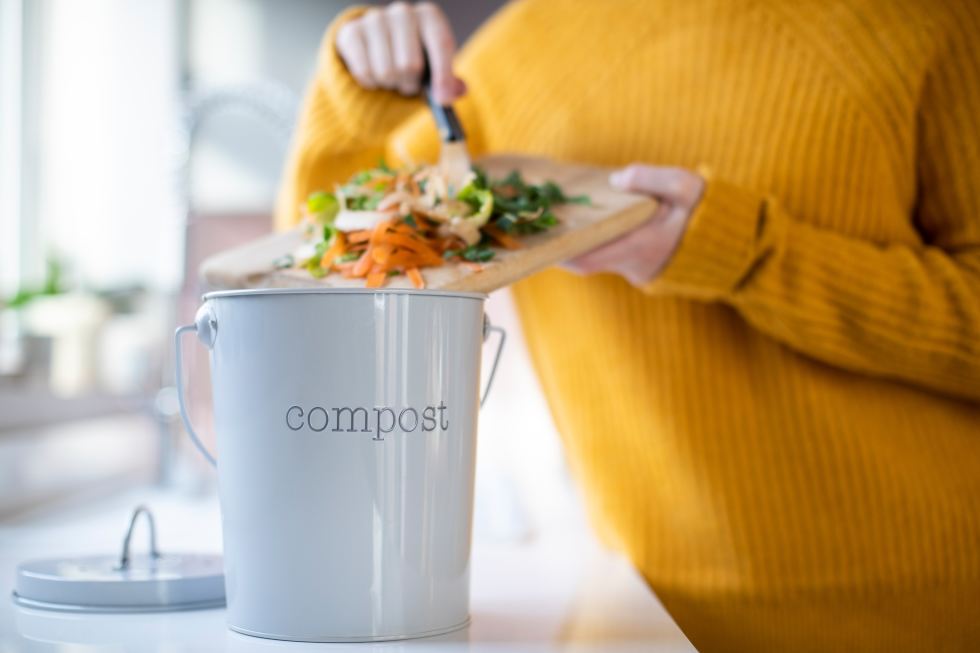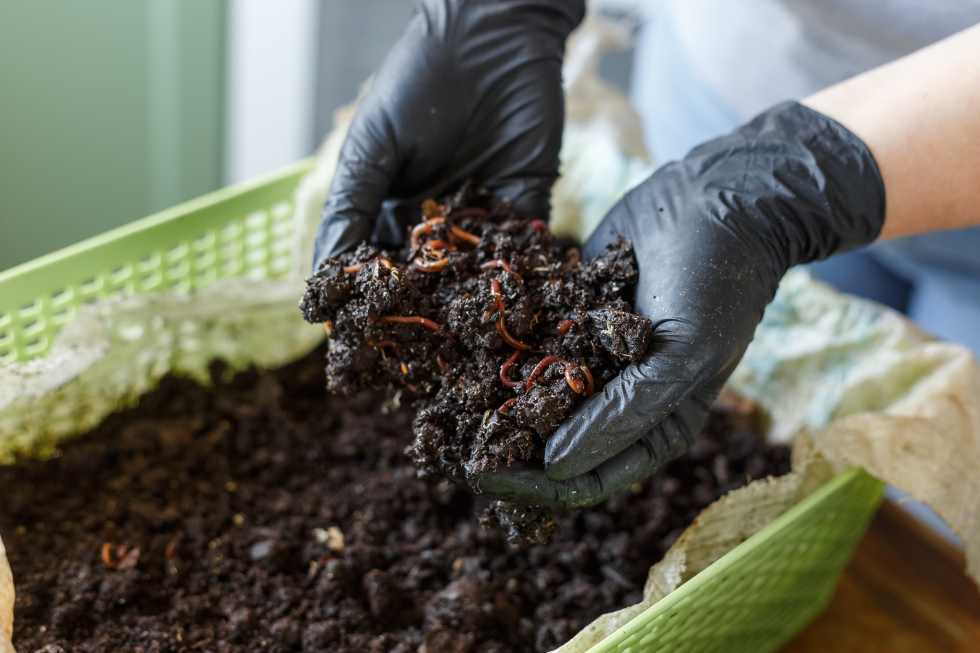South Bank at Quarry Trails
- 92 units available
- Studio • 1 bed • 2 bed • 3 bed
- Amenities
In unit laundry, Patio / balcony, Granite counters, Pet friendly, Stainless steel, Walk in closets + more

Apartment composting is easier than you might think, and turning your waste into nutrient-rich soil only requires a few supplies. Plus, when set up properly, you don’t have to sacrifice a ton of space, worry about an insect infestation, or deal with nasty odors.
Today, we want to teach you how to compost at home by building your own apartment compost bin. Ready to make Mother Nature proud? Let’s dive in!
Compost is a collection of decomposed organic matter that can be recycled as nutrients for your soil or garden. Depending on the size of the composter, the materials you’re trying to break down, and the internal temperature of the container, the aerobic composting process can take a few months or longer.
When the composting process is finished, you’re left with a dark, soil-like material that has a fine texture and a sweet, earthy scent.

Successful home composting relies on organic matter like vegetable food scraps. However, there are plenty of common items you likely have in your household that can be composted, including:
PRO TIP: Make sure to peel off stickers from any fruit or vegetable peels before you compost them, and keep in mind that when you overwhelm your compost with paper goods, they may take months or years to break down.
As a general rule, the more varied your home compost, the richer and more nutrient-rich it will be.
While some farmers and gardening enthusiasts add vegetarian animal waste from rabbits and horses into their compost, we wouldn’t recommend it for composting in an apartment.
Just because an item is a food scrap doesn't mean it belongs in the compost bin.
Meats, dairy, bones, and fats can rot quickly, leaving unpleasant odors and attracting pests.
You should also avoid sickly plants, colored paper, and plastic products you would normally recycle.
Composting offers a variety of benefits, including:
As a country that generates more than 267.8 million tons of municipal waste and only composts 27 million, Mother Nature is ready for people to step it up! Of course, the first question many have is, “How?”
If you don’t have any space for composting outdoors, there are plenty of unique indoor composting methods you can try.
One of the best ways to make indoor compost is with an electric composter. These small appliances can be placed on a kitchen countertop. All you have to do is throw your food scraps in and let it get to work.
Many electric composters work quite quickly, breaking down nutrients into compost in as little as four hours. Lomi is one of the most popular electric composters on the market today, as it can even break down certain styles of packaging and bioplastic.
If you don’t mind a slight smell, you can use an indoor compost bin. Either buy one or build your own! Once your compost is ready, you can bring it to your local organic waste center or community garden.
We recommend reading about the Bokashi method if you want to optimize the decomposition process.

With a worm composter, you’ll put your food scraps in a large bin of worms, either DIY’ed or store-bought, and let them do the work! Vermicomposting worms can be purchased from your local garden center. Best of all, many species enjoy room temperature settings, making them an ideal choice for your indoor home composting system!
If having worms in your space doesn’t sound like your cup of tea, then this may not be the best way to compost at home for you. However, for some, they’re fascinating to watch. Plus, you never have to turn your compost, as the worms move your waste around for you.
If your apartment has a yard space, balcony, or patio, the best way to compost is with a compost tumbler. These airtight units are made to trap heat for optimal composting. All you have to do is turn them over a couple of times each week until you end up with completely decomposed organic matter.
The Bokashi indoor compost method is quite simple. All you really need is a large bucket to add your compost to. Once in the bucket, mash it up and add a microbe-rich activator to speed up the decomposition process.
For more information on how this process works, you can explore the website!
As a last resort, you can use the trench method. It’s essentially how it sounds — you dig a trench or hole and bury your compost. Of course, if you live in an apartment without an outdoor space, finding the place to do this can be difficult.

If you garden, compost is the perfect plant food! However, if gardening isn’t your thing but you still want to make composting in the city worthwhile, here are a few ways to use it:
Is apartment composting smelly? Not necessarily.
While combining food scraps and other waste might seem like it would create a bad smell, proper composting should be fresh and earthy.
The unpleasant odor typically arises when non-organic matter is mixed with organic waste, hindering the proper breakdown of food scraps.
To minimize composting pail odor, daily dumping is recommended, along with using a suitable container and charcoal filters to absorb any smells.
Some renters worry that composting indoors will attract pests. Airtight containers, compost tumblers, and proper storage are essential when it comes to composting. Keep your scraps sealed until you’re ready to move into a compost tumbler or other product and you shouldn't have any issues with pests!
Composting in an apartment doesn't need to be complicated. Focus on appropriate food scraps and some paper products around your home. Then, add them to a portable, easy-to-use compost bin, tumbler, or worm composter.
You can rest easy knowing you're doing your part to help the environment and make some fantastic food for your balcony garden!
Absolutely! Explore space-saving composting options tailored for small apartments. You can compost effectively, even with limited space.
The time varies, but with proper management, you can expect your apartment compost to be ready for use in a few weeks to a few months. Learn the factors that influence composting speed.
Regularly empty your composting pail, use a container designed for apartment composting, and consider adding charcoal filters to absorb any potential odors.



In unit laundry, Patio / balcony, Granite counters, Pet friendly, Stainless steel, Walk in closets + more
In unit laundry, Hardwood floors, Dishwasher, 24hr maintenance, Stainless steel, Walk in closets + more